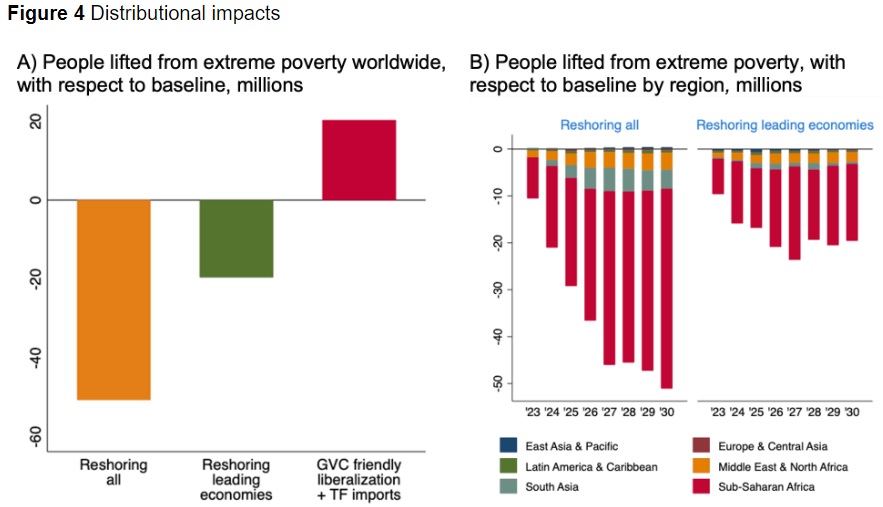Help the World’s Poor with International Trade
May 30, 2022 by Dan Mitchell
I support free trade for selfish reasons. I want my life to be better and I want my country to be richer.
But I also support free trade for selfless reasons. I want other people in other countries to be richer as well.
And rejecting protectionism usually is a way to achieve both my selfish and selfless goals.
But not always. Let’s look at some new evidence about the selfless benefits of open trade and globalization.
In an article for VoxEU, Maksym Chepeliev, Maryla Maliszewska, Israel Osorio Rodarte, Maria Filipa Seara e Pereira, and Dominique van der Mensbrugghe summarize their new research on global value chains.
The authors look at the economic consequences if some or all companies are told they have to rely solely on domestic suppliers (“reshoring”) compared to a world where they engage in cross-border trade.
As you can can see from this chart, you get bad results from some protectionism (reshoring leading economies) or more protectionism (reshoring all economies). Liberalization, by contrast, leads to good results.
Here’s some of what they wrote about their results.
A possible reshoring of production by the leading economies and China would have a negative impact in most regions, with real income decreasing by 1.5% worldwide. A localised world takes the biggest toll on developing countries with the Middle East and North Africa, Rest of East Asia and Pacific, and Europe and Central Asian regions being hit the most severely (Figure 1). However, countries subsidising domestic production would also be worse off as reshoring decreases trade and income, limits the variety of products available to producers and consumers, and increases prices.
If you look closely at Figure 1, you will notice that the United States and other rich nations suffer relatively small income losses from protectionism.
So this is a case where the selfish argument for free trade does not play a big role.
But the selfless argument is very strong. The authors point out that poor nations are the ones that reap big rewards with expanded trade.
Or suffer big losses in a world with more protectionism.
Under the ‘Reshoring all’ scenario, 51.8 million additional people would fall into extreme poverty by 2030, the equivalent to a 0.6% increase in the global extreme poverty headcount ratio. …The ‘GVC-friendly’ scenario, on the other hand, could lift 21.5 million people from extreme poverty by 2030. …In addition, we find that 56.2 million would graduate to global middle-class status, measured as individuals with a per capita consumption of more than PPP $10.00 a day.
Figure 4 shows that protectionism produces more extreme poverty while expanded trade saves people from that awful fate.

Let’s close with two simple observations.
Also, any discussion about trade is incomplete without an acknowledgement that not everyone benefits in the short run from changing patterns of trade.
But that’s true whether the trade is between countries or within countries.
We should acknowledge that new competitors, new technologies, and new products are part of “creative destruction,” which can cause pain for some people in the short run.
The key thing to understand, however, is that this is the process that makes societies far more prosperous in the long run. Moreover, when politicians interfere, they will cause more pain for more people in both the short run and the long run.
Source link
Author Dan Mitchell





